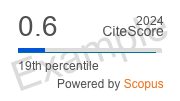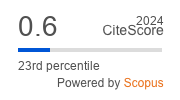Development of HPLC-methodology of determination of amiodarone and desethylamiodarone in human blood plasma
https://doi.org/10.29001/2073-8552-2025-2710
Abstract
Background. Amiodarone is widely used as an antiarrhythmic drug, but its effectiveness is not entirely predictable, and its side effects are not completely controllable. To determine the effective concentration of amiodarone in the blood, a method for quantitative analysis of the drug in the presence of a biological matrix is needed.
Objective. To develop a procedure for quantitative determination of amiodarone (AMI) and desethylamiodarone (DEA) in blood plasma by high-performance liquid chromatography (HPLC).
Materials and Methods. The procedure was developed using an Agilent 1260 Infinity chromatograph with diode array detector (Agilent, USA) on a Tsunami C18 Pharm column (250×4.6 mm, 5 μm) with proprietary stationary phase. Agilent Zorbax SB C8 precolumn (9.4×15 mm, 7 μm) was used to protect the column from mechanical contaminants. Validation was performed according to OFS.1.1.0012.15 “Validation of Analytical Methods” for the following parameters: selectivity, matrix effect, linearity, accuracy, precision, stability and limits of detection and quantification.
Results. The QuEChERS sample preparation was modified to achieve optimal conditions for the extraction of AMI and DEA from the biological matrix. Mobile phase A was phosphate buffer (pH 3, 7.5 mM), mobile phase B was 100% acetonitrile. The separation was performed in gradient mode. Up to 7.00 minutes – the B phase content was 55%, from 7.00 to 7.15 minutes – an increase in B phase content to 85% in order to elute the more hydrophobic components, from 7.15 to 15.00 minutes – the B phase content did not change, followed by a return to the original 50% at 15.15 min. The total analysis time was 18 minutes. Column thermostat temperature was set to 30 °C, flow rate – 1.2 mL/min; injection volume – 80 µL; selective wavelength was 241 nm. The value of retention factor for AMI was 2.25; for DEA – 1.44.
Conclusion. The authors have developed and validated the new HPLC procedure for quantitative identification of AMI and DEA in human blood plasma.
Keywords
About the Authors
E. S. SitkovaRussian Federation
Ekaterina S. Sitkova - Cand. Sci. (Med.), Head of the Laboratory of HighTechnology Diagnostics and Treatment of Cardiac Arrhythmias, Cardiology Research Institute, Tomsk NRMC.
111a, Kievskaya str., Tomsk, 634012
R. E. Batalov
Russian Federation
Roman E. Batalov - Dr. Sci. (Med.), Leading Research Scientist, Laboratory of High-Technology Diagnostics and Treatment of Cardiac Arrhythmias, Cardiology Research Institute, Tomsk NRMC.
111a, Kievskaya str., Tomsk, 634012
D. A. Kurgachev
Russian Federation
Dmitrii A. Kurgachev - Cand. Sci. (Chem.), Senior Research Scientist, Deputy Head of the Laboratory of physical-chemical analytical methods, NR TSU.
36, Lenin Ave., Tomsk, 634050
E. A. Gorn
Russian Federation
Ekaterina A. Gorn - Research Engineer, Laboratory of Supercritical Fluid Research and Application in Agrobiotechnology, NR TSU.
36, Lenin Ave., Tomsk, 634050
K. I. Kazantceva
Russian Federation
Kseniya I. Kazantceva - Laboratory Assistant, Laboratory of Supercritical Fluid Research and Application in Agrobiotechnology, NR TSU.
36, Lenin Ave., Tomsk, 634050
M. A. Dragunova
Russian Federation
Marina A. Dragunova - Cand. Sci. (Med.), Research Scientist, Laboratory of High-Technology Diagnostics and Treatment of Cardiac Arrhythmias, Cardiology Research Institute, Tomsk NRMC.
111a, Kievskaya str., Tomsk, 634012
S. N. Krivolapov
Russian Federation
Sergei N. Krivolapov - Interventional Electrophysiologist, Department of Surgical Arrhythmology and Cardiac Pacing, Cardiology Research Institute, Tomsk NRMC.
111a, Kievskaya str., Tomsk, 634012
T. V. Moskovskich
Russian Federation
Tatyana V. Moskovskich - Junior Research Scientist, Laboratory of HighTechnology Diagnostics and Treatment of Cardiac Arrhythmias, Cardiology Research Institute, Tomsk NRMC.
111a, Kievskaya str., Tomsk, 634012
S. V. Popov
Russian Federation
Sergey V. Popov - Dr. Sci. (Med.), Professor, Academician of the Russian Academy of Sciences, Director, Cardiology Research Institute, Tomsk NRMC.
111a, Kievskaya str., Tomsk, 634012
References
1. Connolly S.J. Evidence-based analysis of amiodarone efficacy and safety. Circulation. 1999;100(19):2025–2034. https://doi.org/10.1161/01.cir.100.19.2025
2. Шубик Ю.В., Медведев М.М., Михайлов Е.Н., Гасымова Н.З., Гиляров М.Ю. Лечение фибрилляции предсердий в России: реальная клиническая практика и рекомендации. Вестник аритмологии. 2021;28(2):55–63. https://doi.org/10.35336/VA-2021-2-55-63
3. Tatarsky B.A., Kazennova N.V. Chronic kidney disease and atrial fibrillation: approaches to the choice of antiarrhythmic therapy. Siberian Journal of Clinical and Experimental Medicine. 2023;38(4):20-28. (In Russ.) https://doi.org/10.29001/2073-8552-2023-38-4-20-28
4. O'Bryan L.J., Redfern O.C., Bedford J., Petrinic T., Young J.D., Watkinson P.J. Managing new-onset atrial fibrillation in critically ill patients: a systematic narrative review. BMJ Open. 2020;10(3):e034774. https://doi.org/10.1136/bmjopen-2019-034774
5. Holt D.W., Tucker G.T., Jackson P.R. Storey G.C. Amiodarone pharmacokinetics. Am. Heart J. 1983;106(4 Pt 2):840–847. https://doi.org/10.1016/0002-8703(83)90006-6
6. Adams P.C., Holt D.W., Storey G.C., Morley A.R., Callaghan J., Campbell R.W. Amiodarone and its desethyl metabolite: tissue distribution and morphologic changes during long-term therapy. Circulation. 1985;72(5):1064–1075. https://doi.org/10.1161/01.cir.72.5.1064
7. Nattel S., Talajic M., Fermini B., Roy D.Amiodarone: Pharmacology, clinical actions, and relationships between them. J. Cardiovasc. Electrophysiol. 1992;3(3):266–280. https://doi.org/10.1111/j.1540-8167.1992.tb00972.x
8. Connolly S.J. Effect of prophylactic amiodarone on mortality after acute myocardial infarction and in congestive heart failure: meta-analysis of individual data from 6500 patients in randomised trials. Amiodarone trials meta-analysis investigators. Lancet (London, England). 1997;350(9089):1417–1424. PMID: 9371164
9. Shenthar J., Rachaiah J.M., Pillai V., Chakali S.S., Balasubramanian V., Chollenhalli Nanjappa M. Incidence of drug-induced torsades de pointes with intravenous amiodarone. Indian Heart J. 2017;69(6):707–713. https://doi.org/10.1016/j.ihj.2017.05.024
10. Hohnloser S.H., Klingenheben T., Singh B.N. Amiodarone-associated proarrhythmic effects. A review with special reference to torsade de pointes tachycardia. Ann. Intern. Med. 1994;121(7):529–535. https://doi.org/10.7326/0003-4819-121-7-199410010-00009
11. Pérez-Ruiz T., Martínez-Lozano C., García-Martínez M.D. Simultaneous determination of amiodarone and its metabolite desethylamiodarone by high-performance liquid chromatography with chemiluminescent detection. Anal. Chim. Acta. 2008;623(1):89–95. https://doi.org/10.1016/j.aca.2008.06.003
12. Rodrigues M., Alves G., Ferreira A., Queiroz J., Falcão A. A rapid HPLC method for the simultaneous determination of amiodarone and its major metabolite in rat plasma and tissues: a useful tool for pharmacokinetic studies. J. Chromatogr. Sci. 2013;51(4):361–370. https://doi.org/10.1093/chromsci/bms149
13. Tieleman R.G., Gosselink A.T., Crijns H.J., van Gelder I.C., van den Berg M.P., de Kam P.J. et al. Efficacy, safety, and determinants of conversion of atrial fibrillation and flutter with oral amiodarone. Am. J. Cardiol. 1997;79(1):53–57. https://doi.org/10.1016/s0002-9149(96)00675-3
14. Mostow N.D., Vrobel T.R., Noon D., Rakita L. Rapid suppression of complex ventricular arrhythmias with high-dose oral amiodarone. Circulation. 1986;73(6):1231–1238. https://doi.org/10.1161/01.cir.73.6.1231
15. Rotmensch H.H., Swanson B.N., Greenspon A.J., Shoshani D., Greenspan A.M. Amiodarone: individualizing dosage with serum concentrations. Pacing Clin. Electrophysiol. 1983;6(6):1327–1335. https://doi.org/10.1111/j.1540-8159.1983.tb04475.x
16. Haffajee C.I., Love J.C., Canada A.T., Lesko L.J., Asdourian G., Alpert J.S. et al. Clinical pharmacokinetics and efficacy of amiodarone for refractory tachyarrhythmias. Circulation. 1983;67(6):1347–1355. https://doi.org/10.1161/01.cir.67.6.1347
17. Debbas N.M., du Cailar C., Bexton R.S., Demaille J.G., Camm A.J., Puech P. The QT interval: a predictor of the plasma and myocardial concentrations of amiodarone. Br. Heart J. 1984;51(3):316–320. https://doi.org/10.1136/hrt.51.3.316
Supplementary files
Review
For citations:
Sitkova E.S., Batalov R.E., Kurgachev D.A., Gorn E.A., Kazantceva K.I., Dragunova M.A., Krivolapov S.N., Moskovskich T.V., Popov S.V. Development of HPLC-methodology of determination of amiodarone and desethylamiodarone in human blood plasma. Siberian Journal of Clinical and Experimental Medicine. 2025;40(4):169-183. https://doi.org/10.29001/2073-8552-2025-2710
JATS XML





.png)





























